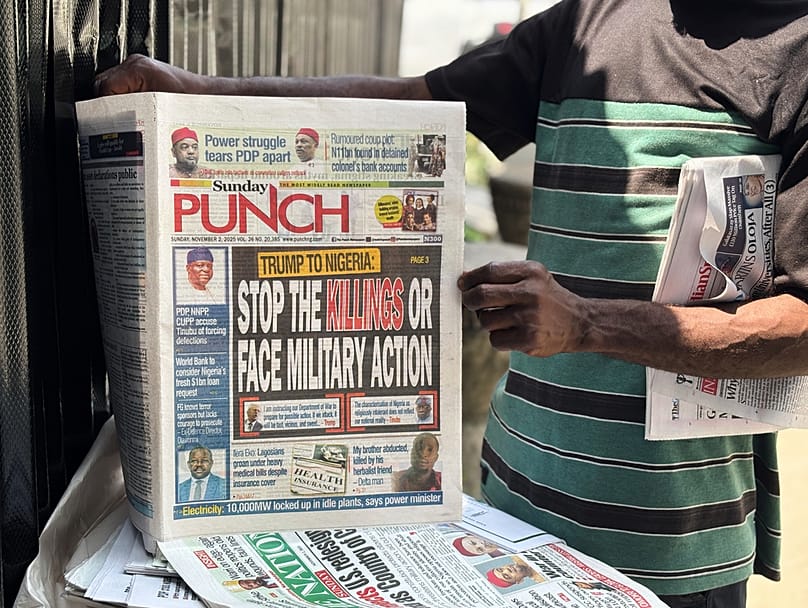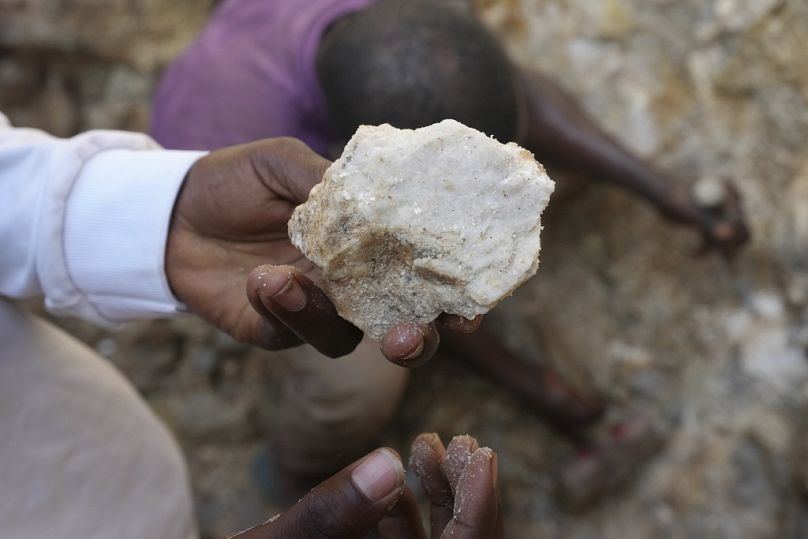Despite a positive reception in some quarters to a potential military intervention by the US, many also fear Trump's remarks could be linked to Nigeria's rare earth and mineral resources.
Nigeria is on edge over the longstanding and controversial subject of alleged Christian persecution and the threat of military action from US President Donald Trump, something Abuja has rejected.
On Sunday, many Nigerians woke up to the news of Trump's order to the Pentagon asking it to begin planning for potential military action to deal with the decades-long problem.
"If the Nigerian government continues to allow the killing of Christians, the U.S.A. will immediately stop all aid and assistance to Nigeria and may very well go into that now disgraced country, ‘guns-a-blazing,’ to completely wipe out the Islamic terrorists who are committing these horrible atrocities," Trump said in a social media post on Saturday.
"I am hereby instructing our Department of War to prepare for possible action. If we attack, it will be fast, vicious, and sweet, just like the terrorist thugs attack our CHERISHED Christians!"
In response, Nigeria's President Bola Ahmed Tinubu said on Sunday his administration would be open to meeting with Trump to talk about counterterrorism and security cooperation, stressing that any collaboration must respect Nigeria's sovereignty.
Earlier, Tinubu said in a post on X that the characterisation of Nigeria as a religiously intolerant country does not reflect the national reality.
Trump's threat might be a "negotiating tactic," Tinubu's spokesperson Daniel Bwala said on Sunday, explaining that Nigeria and the US already collaborate extensively on countering Islamist insurgents through intelligence sharing and arms procurement.
But the issue of Christian persecution and genocide has raged for decades in Africa's biggest economy.
In May, rights group Amnesty International reported that more than 10,000 people had been killed in jihadist attacks across central and northern Nigeria in the two years since President Bola Tinubu took office.
An issue far more complex
With a population of around 220 million, split almost equally between Christians and Muslims, Nigeria has long faced insecurity from various fronts, including the Boko Haram extremist group, which seeks to establish its radical interpretation of Islamic law and has also targeted Muslims it deems are not devout enough.
For Washington, the situation is a Christian genocide, but for many Nigerians, it is an issue that's far more complex.
While Christians are often systematically targeted, the majority of victims of armed groups, many analysts say, are Muslims in Nigeria's Muslim-majority north, where most attacks occur.
Some Nigerian Christian Evangelicals disagree, insisting they have historically mostly borne the brunt of Islamist attacks.
The Reverend Ezekiel Dachomo claims a massacre is going on, but an attempt to deny it or describe it as a broader problem is being orchestrated by the government.
With some estimates claiming 7,000 Christian deaths were reported in 2025 alone and thousands more uprooted or abducted, advocacy groups like Open Doors and International Christian Concern characterise the attacks by Islamist terrorists, such as Boko Haram and Fulani extremists, as targeted persecution.
The numbers are being disputed by the government. But a 2014 statement by President Tinubu, when he was opposition leader, criticising former President Goodluck Jonathan for not protecting Christian worshippers, resurfaced in local reports during the weekend as the country debated Trump's threats of military action.
Trump's threat mired in strategic resource interests
The threats came weeks after US Senator Ted Cruz urged Congress to designate Africa's most populous country as a violator of religious freedom with claims of "Christian mass murder."
While it stirred controversy in the country, another debate is raging: should Nigeria welcome US troops or any outside military intervention?
"If it would help to safeguard our communities, we welcome it," says Cyril Abaku, Nigerian broadcaster and political commentator.
"I think that we are at a level where terrorism is now a global problem, and our communities don't feel safe, and so if we have support from outside coming to say, 'We want to work with you to help stem the tide,' I think we should buy it. This is something we should welcome, frankly." Abaku said.
Despite the somewhat positive reception to a military intervention from the US, many also fear that Trump's recent remarks are not simply humanitarian concerns but are potentially tied to strategic resource interests.
According to some analysts, Nigeria's increasing significance in the area of rare earth elements and key minerals, necessary for defence technologies, renewable energy, and electric vehicles, casts Trump's concerns in a different light.
Significant monazite deposits, rich in lithium, nickel, cobalt, copper, lanthanum, neodymium, and praseodymium, can be found in the troubled northeast of Nigeria, the haven of the Islamist insurgency.
"What Nigeria truly needs is not a foreign saviour", says human rights activist Omoyele Sowore.
Nigeria needs legitimate, accountable leadership, one that protects all citizens, upholds justice, and ends the cycles of corruption and violence that have left the nation broken, the former presidential candidate said.
The United States initially designated Nigeria as a "country of particular concern" in 2020 due to what the State Department then described as "systematic violations of religious freedom."
However, attacks against Christians were not specifically mentioned in that classification.













